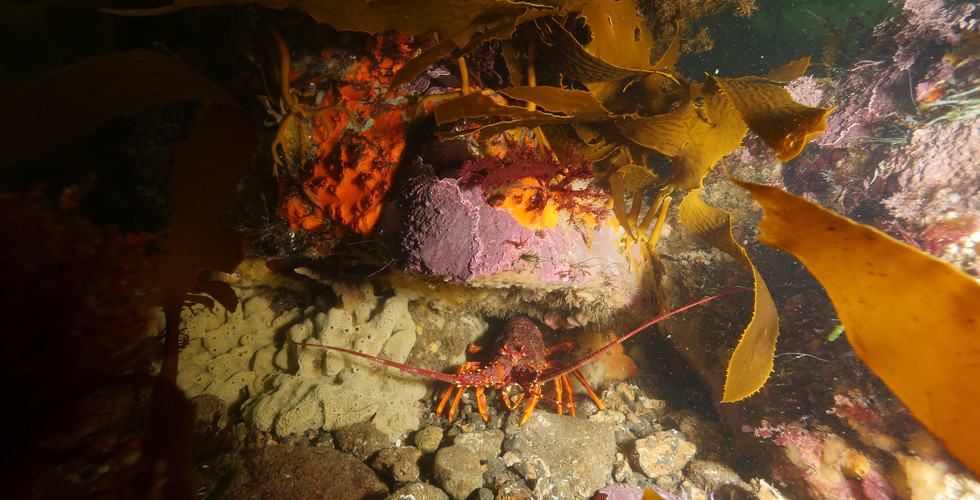Early November 2021: IntelliReefs CAN Ready to Launch Canadian Kelp Restoration
- IntelliReefs NanoTech Team
- Dec 30, 2021
- 3 min read
Updated: Jan 17, 2022

IntelliReefs CAN's first Canadian kelp restoration project has arrived at the Centre for Ocean Ventures and Entrepreneurship (COVE) in Dartmouth, Nova Scotia.
HALIFAX, NS —
Published October 28, 2021
This week, IntelliReefs CAN's first shipment of ReefShip restoration modules made from Oceanite nanotechnology arrived at the Centre for Ocean Ventures and Entrepreneurship (COVE) in Dartmouth, Nova Scotia. This will be the flagship cold water, or "temperate ecosystem" project for IntelliReefs. The aim of this large scale artificial reef deployment in Dartmouth Cove is to ascertain the efficacy and impact of Oceanite for kelp forest, oyster bed, and near-shore fisheries restoration. This project follows the recent announcement of the UN Decade of Ocean Science for sustainable development's endorsement of IntelliReefs' Decade Action in a letter from the Executive Secretary of IOC-UNESCO.
IntelliReefs is on the ground in Nova Scotia collaborating with researchers to deploy and monitor a series of small to large-scale experiments to test the benefits of Oceanite to temperate water kelp forest ecosystems. Dalhousie researchers are examining whether Oceanite is a suitable substrate for kelp seeding.
Kelp are one of the most productive and biomass-dense ecosystems on the planet, with an estimated global economic value of $684 billion USD per year. Their ability to capture and sequester carbon from the atmosphere makes them a valuable resource in the fight against climate change. The potential of using kelp for rapid and strategic for carbon capture in a changing climate has received a lot of validation from policy makers and academics around the world. Supported by an early investment from Innovacorp and the Ocean Startup Challenge Award (Growth Stream), IntelliReefs will be working with researchers from Dalhousie University to monitor and measure the growth of kelp and other algae on the temperate ReefShip modules deployed at COVE. The team plans to submerge their novel technology during the third week of November, along with local partner Dominion Diving.

IntelliReefs' ReefShip design mimics the architecture, geology, and chemistry of natural tropical and temperate reefs. ReefShip quickly builds 3D complexity and structure where it has been lost due to climate change, coastal development, and pollution in order to feed and shelter fish and invertebrates, and provide biomimicking substrates that attract and sustain kelp and shellfish species.
ReefShip visually integrates itself within the local ecosystem while creating a platform for collaboration with local conservation organizations and academic researchers by providing a platform for experimentation and restoration. The modular nature of the design enables deeply unique approaches to serving objectives. This allows for the freedom to make targeted and local solutions, housings for specific scientific equipment, and integrations with tourism and coral out-planting goals.
Kelp forests are one of the most productive and biomass-dense ecosystems on the planet and provide food, nutrients, and habitat for commercially important fish and invertebrate animals. Kelp are brown algae that grow in cold, shallow, nutrient-rich waters, and can be found on every continent worldwide. Their root system, called a “holdfast”, fastens itself to hard underwater substrates - like boulders and bedrock. Just like trees on land, they use carbon dioxide and light to photosynthesize, creating one of the largest carbon sequestering biomes on Earth. When kelp break from their holdfasts due to age or weather, they transport the carbon in their tissues to the deep ocean. This not only provides deep sea animals with a food source, but also commits carbon into long-term storage in sediment. Some species of kelp can grow up to 65m long, and research has shown that kelp forests along the southern coast of Australia sequester over 1.3–2.8 teragrams of carbon per year. This region alone contributes ~3% of the total global carbon sequestration.

Around the world, massive kelp beds are rapidly declining due to coastal development and erosion, warming waters, invasive species, poor water quality, pollution, and overfishing. As a consequence of losing these lush underwater forests, fisheries and ocean-based economies around the world are in serious jeopardy. As with many other regions in the world, Nova Scotia’s prolific kelp beds are steadily declining. Researchers have documented an 85-99% decline in kelp biomass over the past 4-6 decades of Atlantic coast of Nova Scotia. “The ocean is vital. It’s actually been BUFFERING climate change for us, and that’s a TREMENDOUS service.” — Dr. Julie Pullen Blue carbon and innovations that seek to harness its power have the potential to mitigate rising CO2 emissions and their disastrous consequences. IntelliReefs CAN's mission is to turn grey infrastructure "blue", creating a conservation opportunity within what has traditionally been a highly unsustainable industry. The cement industry has a massive carbon footprint and is the third highest carbon dioxide (CO2) contributor in the world, annually contributing about 8% of global emissions. IntelliReefs' manufacturing constitutes about half of the emissions of concrete and is engineered to enhance the growth of kelp for decades, capturing carbon from the atmosphere annually.




























Comments